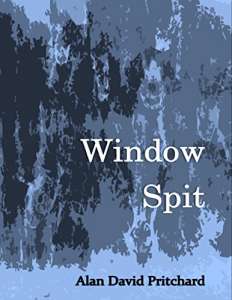
In Window Spit, poet Alan David Pritchard expresses how reflections through an imagined window can reveal the way a poet sees the world outside, and the way he sees himself.
Pritchard is an author, educator, and poet who has chosen in Window Spit to depict himself as both observer and the observed. Part I of the collection – “Looking Out” – details in verse his view of humanity through a hypothetical glass. He warns, “Beware the poet who spits in your eye.”
In several poems, Pritchard laments that people choose to communicate with unseen others on their wifi devices even while in someone’s personal company:
I cannot touch you
unless you’re behind
a screen.
As regards smoking cigarettes, a disillusioned date poses the questions, “Do you have to? Really?” In “Just Sayin'” the author notes some unpleasant truths about conflicts in the Middle East; before 9-1-1, for a macabre example, he says there were no suicide bombers—yet governments continue to wage war in the name of “my freedom.” Part II concludes by asking what “the poet, and the painter too” can do when “the wells of empathy have run dry.”
Part II, “Looking In,” is the poet’s view of his feelings and fantasies, and those of others. He sardonically disclaims his status as a “real poet” – perhaps he merely has “OCD, is obsessed by words. He depicts the process of creativity, in which, like a fussy parent, he wants to dress up words instead of letting them run “barefoot and free.” He contemplates the aloneness of the creative personality, depicting himself as a brooding character standing in the corner, exuding contempt for those who intrude on his chosen self-involvement. He deftly describes “The Sociopath,” who would rather talk to himself than engage in dialog with another person. In an ironic vein, he attacks someone overwrought after a minor office spat while there are people terrified by drones and bombs and surrounded by death.
In the end, his musings lead to the conclusion that the poet needs to “Put Down” his words and pay attention to the ills of the world around him. Pritchard presents himself as an intense personality with certain noble concerns – alienation and war, especially in the Middle East – that he feels must be expressed and understood through poetry. One poem creates a metaphorical scenario involving victims of conflict trying to move into his home with him, bringing all their family needs and cultural restrictions, expressing his wish to help in the worldwide refugee crisis. Yet, paradoxically, in another poem he berates himself, as a creative artist, for his introversion, and his withdrawal from the real world of social connection.
His work is at its best when expressed in free form; some poems in the collection strain the rigid restrictions of rhythm and rhyme. Though his surveillance, in Part I, of current disturbing issues is powerfully critical and at times even sorrowful, the second half of the collection emerges as the more potent, with sage and, at times, surprising observations about human nature that seem to be Pritchard’s most stable ground.
In total, Window Spit is an invigorating collection covering a wide range of moods and themes that is at once challenging and rewarding.
Links
Author Site
Facebook
Amazon
Goodreads
STAR RATING
Design
Content
Editing
Get an Editorial Review | Get Amazon Sales & Reviews | Get Edited | Get Beta Readers | Enter the SPR Book Awards | Other Marketing Services























Leave A Comment